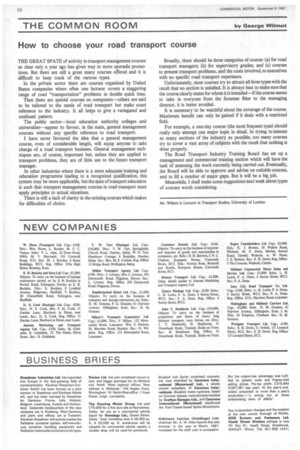How to choose your road transport course
Page 72

If you've noticed an error in this article please click here to report it so we can fix it.
THE GREAT SPATE of activity in transport management courses so clear only a year ago has given way to more sporadic promotions. But there are still a great many courses offered and it is difficult to keep track of the various types.
In the private sector there are courses organized by United States companies where often one lecturer covers a staggering range of road "transportation" problems in double quick time.
Then there are special courses on computers—others are said to be tailored to the needs of road transport but make scant reference to the industry. It all helps to give a variegated and confused pattern.
The public sector—local education authority colleges and universities—appear to favour, in the main, general management courses without any specific reference to road transport.
I have never favoured the idea that a general management course, even of considerable length, will equip anyone to take charge of a road transport business. General management techniques are, of course, important but, unless they are applied to transport problems, they are of little use to the future transport manager.
In other industries where there is a more adequate training and education programme leading to a recognized qualification, this system may be more applicable, but the state of transport education is such that transport management courses in road transport must apply principles to actual situations.
There is still a lack of clarity in the existing courses which makes for difficulties of choice. Broadly, there should be three categories of course: (a) for road transport managers; (b) for supervisory grades; and (c) courses to present transport problems, and the costs involved, to executives with no specific road transport experience.
Unfortunately, most courses try to attract all three types with the result that no section is satisfied. It is always best to make sure that the course clearly states for whom it is intended—if the course seems to take in everyone from the foreman fitter to the managing director, it is better avoided.
It is necessary to be watchful about the coverage of the course. Maximum benefit can only be gained if it deals with a restricted field.
For example, a one-day course (the most frequent type) should really only attempt one major topic in detail. In trying to interest as many sections of the industry as possible, too many courses try to cover a vast array of subjects with the result that nothing is done properly.
The Road Transport Industry Training Board has set up a management and commercial training section which will have the task of assessing the work currently being carried out. Eventually, the Board will be able to approve and advise on suitable courses, and to fill a number of major gaps. But it will be a big job.
Meanwhile, I shall make some suggestions next week about types of courses worth considering.




















































































































